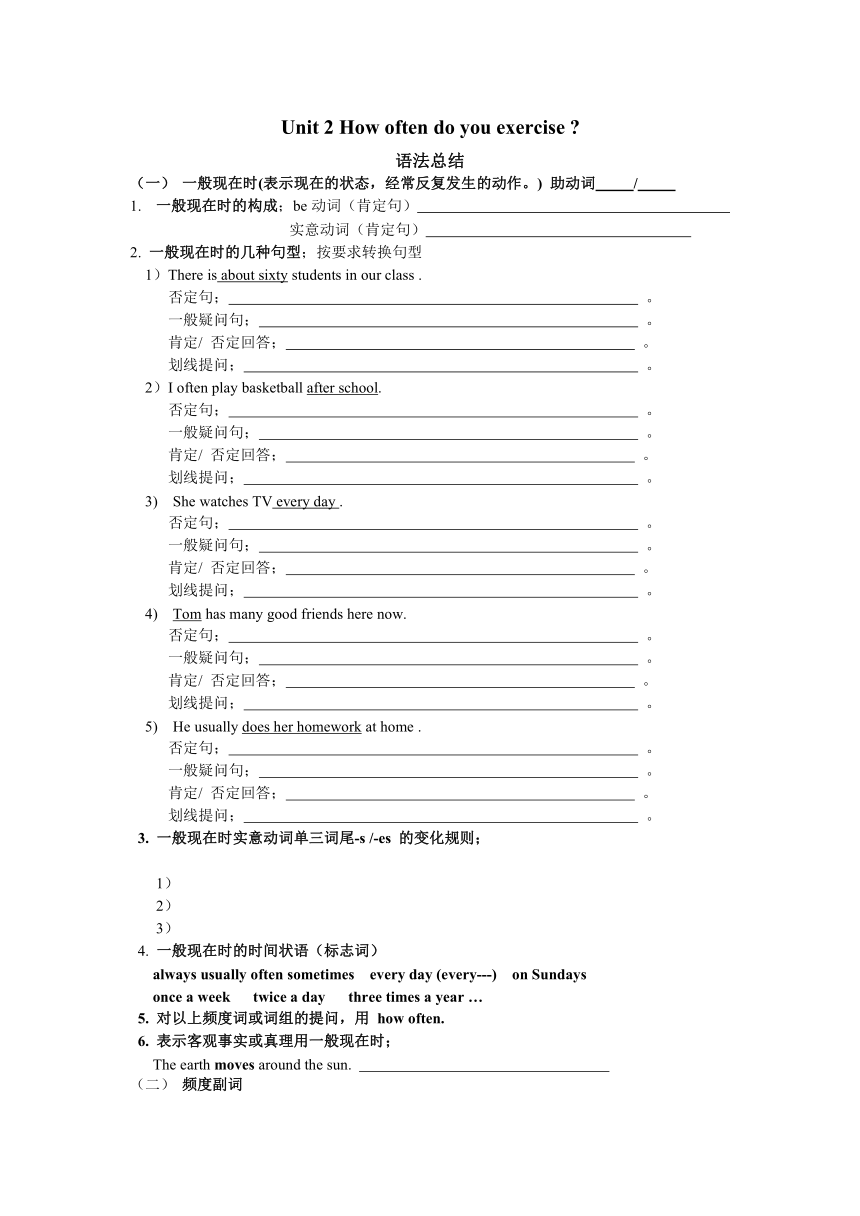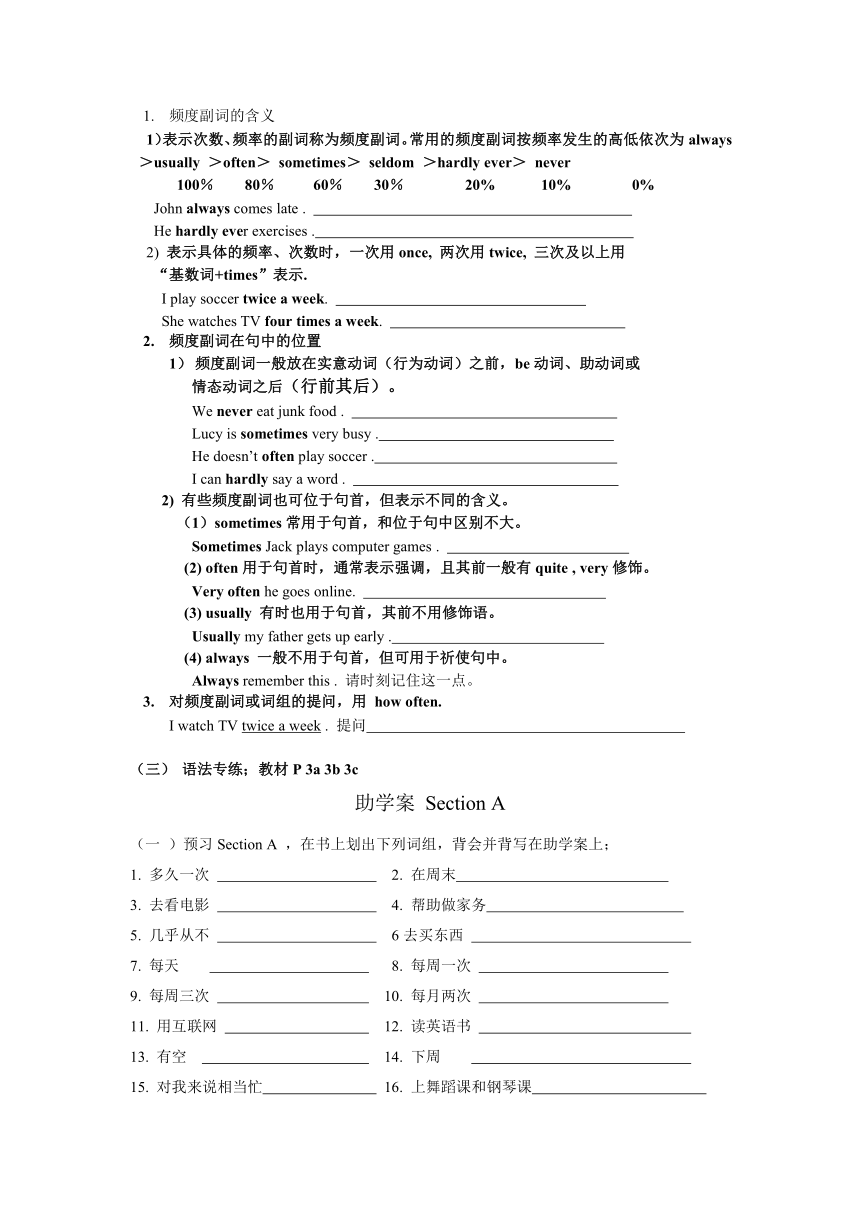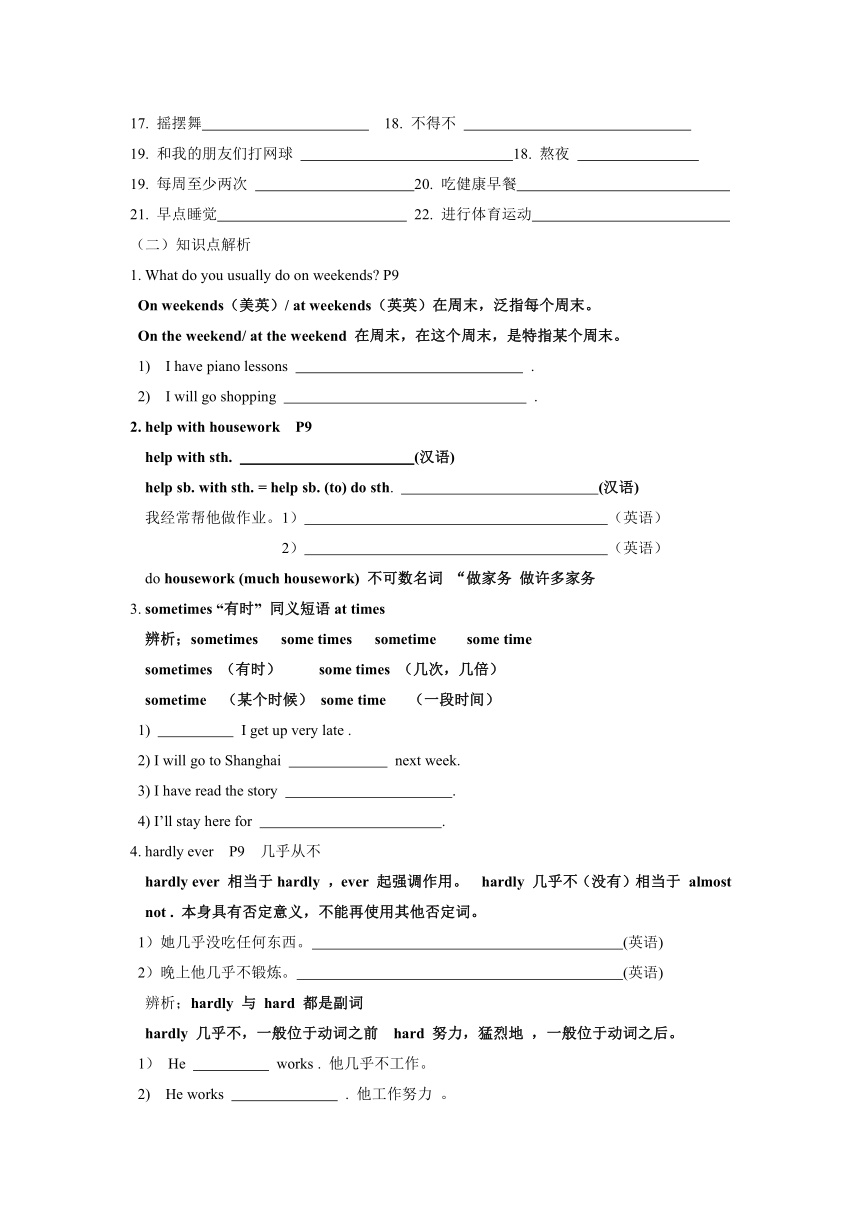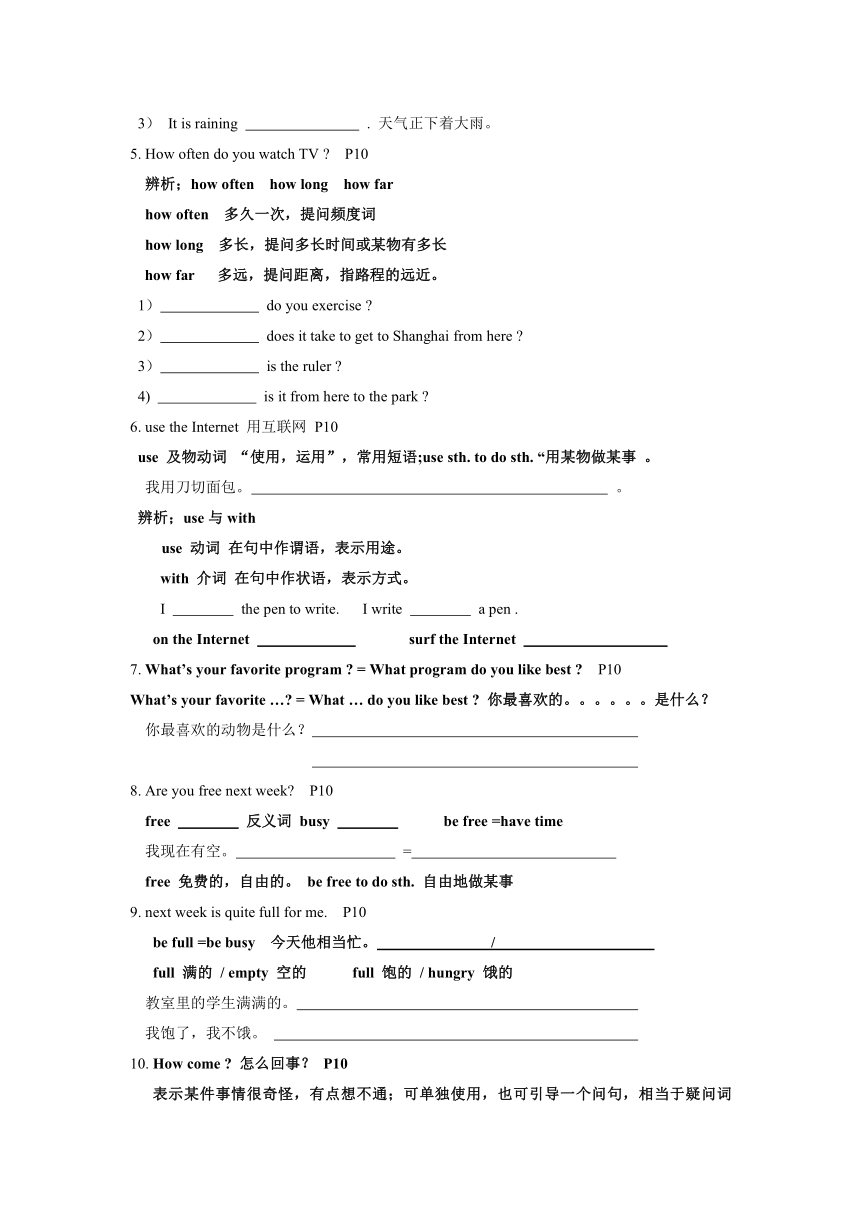Unit 2 How often do you exercise?学案
文档属性
| 名称 | Unit 2 How often do you exercise?学案 |

|
|
| 格式 | zip | ||
| 文件大小 | 39.4KB | ||
| 资源类型 | 教案 | ||
| 版本资源 | 人教新目标(Go for it)版 | ||
| 科目 | 英语 | ||
| 更新时间 | 2013-12-04 00:00:00 | ||
图片预览




文档简介
Unit 2 How often do you exercise ?
语法总结
一般现在时(表示现在的状态,经常反复发生的动作。) 助动词 /
一般现在时的构成;be动词(肯定句)
实意动词(肯定句)
2. 一般现在时的几种句型;按要求转换句型
1)There is about sixty students in our class .
否定句; 。
一般疑问句; 。
肯定/ 否定回答; 。
划线提问; 。
2)I often play basketball after school.
否定句; 。
一般疑问句; 。
肯定/ 否定回答; 。
划线提问; 。
3) She watches TV every day .
否定句; 。
一般疑问句; 。
肯定/ 否定回答; 。
划线提问; 。
4) Tom has many good friends here now.
否定句; 。
一般疑问句; 。
肯定/ 否定回答; 。
划线提问; 。
5) He usually does her homework at home .
否定句; 。
一般疑问句; 。
肯定/ 否定回答; 。
划线提问; 。
3. 一般现在时实意动词单三词尾-s /-es 的变化规则;
1)
2)
3)
4. 一般现在时的时间状语(标志词)
always usually often sometimes every day (every---) on Sundays
once a week twice a day three times a year …
5. 对以上频度词或词组的提问,用 how often.
6. 表示客观事实或真理用一般现在时;
The earth moves around the sun.
频度副词
频度副词的含义
1)表示次数、频率的副词称为频度副词。常用的频度副词按频率发生的高低依次为always >usually >often> sometimes> seldom >hardly ever> never
100% 80% 60% 30% 20% 10% 0%
John always comes late .
He hardly ever exercises .
2) 表示具体的频率、次数时,一次用once, 两次用twice, 三次及以上用
“基数词+times”表示.
I play soccer twice a week.
She watches TV four times a week.
频度副词在句中的位置
频度副词一般放在实意动词(行为动词)之前,be动词、助动词或
情态动词之后(行前其后)。
We never eat junk food .
Lucy is sometimes very busy .
He doesn’t often play soccer .
I can hardly say a word .
2) 有些频度副词也可位于句首,但表示不同的含义。
(1)sometimes常用于句首,和位于句中区别不大。
Sometimes Jack plays computer games .
(2) often用于句首时,通常表示强调,且其前一般有quite , very修饰。
Very often he goes online.
(3) usually 有时也用于句首,其前不用修饰语。
Usually my father gets up early .
(4) always 一般不用于句首,但可用于祈使句中。
Always remember this . 请时刻记住这一点。
对频度副词或词组的提问,用 how often.
I watch TV twice a week . 提问
语法专练;教材P 3a 3b 3c
助学案 Section A
(一 )预习Section A ,在书上划出下列词组,背会并背写在助学案上;
1. 多久一次 2. 在周末
3. 去看电影 4. 帮助做家务
5. 几乎从不 6去买东西
7. 每天 8. 每周一次
9. 每周三次 10. 每月两次
11. 用互联网 12. 读英语书
13. 有空 14. 下周
15. 对我来说相当忙 16. 上舞蹈课和钢琴课
17. 摇摆舞 18. 不得不
19. 和我的朋友们打网球 18. 熬夜
19. 每周至少两次 20. 吃健康早餐
21. 早点睡觉 22. 进行体育运动
(二)知识点解析
1. What do you usually do on weekends? P9
On weekends(美英)/ at weekends(英英)在周末,泛指每个周末。
On the weekend/ at the weekend 在周末,在这个周末,是特指某个周末。
1) I have piano lessons .
2) I will go shopping .
2. help with housework P9
help with sth. (汉语)
help sb. with sth. = help sb. (to) do sth. (汉语)
我经常帮他做作业。1) (英语)
2) (英语)
do housework (much housework) 不可数名词 “做家务 做许多家务
3. sometimes “有时” 同义短语at times
辨析;sometimes some times sometime some time
sometimes (有时) some times (几次,几倍)
sometime (某个时候) some time (一段时间)
1) I get up very late .
2) I will go to Shanghai next week.
3) I have read the story .
4) I’ll stay here for .
4. hardly ever P9 几乎从不
hardly ever 相当于hardly ,ever 起强调作用。 hardly 几乎不(没有)相当于 almost not . 本身具有否定意义,不能再使用其他否定词。
1)她几乎没吃任何东西。 (英语)
2)晚上他几乎不锻炼。 (英语)
辨析;hardly 与 hard 都是副词
hardly 几乎不,一般位于动词之前 hard 努力,猛烈地 ,一般位于动词之后。
1) He works . 他几乎不工作。
2) He works . 他工作努力 。
3) It is raining . 天气正下着大雨。
5. How often do you watch TV ? P10
辨析;how often how long how far
how often 多久一次,提问频度词
how long 多长,提问多长时间或某物有多长
how far 多远,提问距离,指路程的远近。
1) do you exercise ?
2) does it take to get to Shanghai from here ?
3) is the ruler ?
4) is it from here to the park ?
6. use the Internet 用互联网 P10
use 及物动词 “使用,运用”,常用短语;use sth. to do sth. “用某物做某事 。
我用刀切面包。 。
辨析;use与with
use 动词 在句中作谓语,表示用途。
with 介词 在句中作状语,表示方式。
I the pen to write. I write a pen .
on the Internet surf the Internet
7. What’s your favorite program ? = What program do you like best ? P10
What’s your favorite …? = What … do you like best ? 你最喜欢的。。。。。。是什么?
你最喜欢的动物是什么?
8. Are you free next week? P10
free 反义词 busy be free =have time
我现在有空。 =
free 免费的,自由的。 be free to do sth. 自由地做某事
9. next week is quite full for me. P10
be full =be busy 今天他相当忙。 /
full 满的 / empty 空的 full 饱的 / hungry 饿的
教室里的学生满满的。
我饱了,我不饿。
10. How come ? 怎么回事? P10
表示某件事情很奇怪,有点想不通;可单独使用,也可引导一个问句,相当于疑问词why 。但How come开头的特殊疑问句,后面接陈述语序。
How come you didn’t tell me about it ? = Why didn’t you tell me about it ?
你怎么不早点告诉我这件事?
How come Tom didn’t come to the party?
11. I have dance and piano lessons . p10
lesson 课,课程 可数名词
have lessons /do one’s lesson / Lesson One=the first lesson
lesson 教训 Let me give him a lesson .
12. How about Tuesday ? p10
How about…,? = What about … ?”。。。怎么样?” 用来向对方征求意见。
How about +名词/代词/动名词? = What about +名词/代词/动名词 ?
买些香蕉怎么样? ?
我喜欢蔬菜,你呢? ?
13. I go to the movies maybe once a month .
辨析 ;maybe 与may be
maybe 副词 “也许,大概,可能”位于句首,后面通常接一个句子。
may be 属于“情态动词 may +be动词”意为 “可能是”
1) you are right . = 2) You right .
14. How often do they stay up late ? p11
stay up late 熬夜到很晚,迟睡 stay up 熬夜,不睡觉
1)Don’t next time .
2) He all night to write his story .
15. He plays at least twice a week . p11
at least 至少 at most 至多
至少1500名学生 / 至多50名教师
16. They always go to bed early. P11
辨析;go to bed 与go to sleep
go to bed 强调“上床睡觉”的动作及过程,但人不一定睡着。
go to sleep 强调“入睡,睡着;进入梦乡”
1)I at eleven last night .
2) She was so tired that she soon .
early 形容词/副词 反义词 late形容词/副词
助学案 Section B
(一 )预习Section A ,在书上划出下列词组,背会并背写在助学案上;
1. 对。。。。有好处 2. 去野营
3. 他们的业余活动 4. 仅有15%的学生
5. 一周4—6 次 6. 根本不
7. 上网 8.一周至少3或4次
9. 我们问题的答案 10. 喜欢观看运动类节目
11. 最受欢迎的 12. 放松是好的
13. 通过用互联网或看游戏类节目
14. 做某事最好的方式
15. 对于身心 16. 比如进行运动
17. 和。。。度过时光 18. 积习难改
19. 去看牙医 20. 一名16岁的中学生
21. 为清洁牙齿 22. 一周几次
23. 几乎每天 24. 5个小时或更多
(二)知识点解析;
1. But my mother wants me to drink it . P12
want sth. 想要某物 want to do sth. 想(要)做某事
want sb. to do sth. 想让某人做某事 want sb. not to do sth 不想让某人做某事
你想要些英语书吗?
你想告诉我一些有趣的事情吗?
他想让我给他买些钢笔。
She says it’s good for my health . P12
be good for 对。。。。。。有益 be bad for 对。。。。。。有害
辨析;be good for对。。。有益 / be good at 擅长 / be good with 和。。。相处得好
1)I (playing) basketball.
2) Doing morning exercises your health.
3) My English teacher children .
my health 名词“健康” be healthy 形容词 “健康的”
3. How many hours do you sleep every night ? p12
how many +可数名词复数 (提问数量)
how much +不可数名词 (提问数量)
how much 单独使用 (提问价格)
1) books do you have ?
2) water do you want?
3) are your shoes ?
4. Last month we asked our students about their free time activities. P13
ask sb. about sth.
5. Here are the results . p13
here 位于句首,句子要倒装。
Here开头的倒装句分为完全倒装和部分倒装,使用哪种倒装句取决于句子主语的词性。1)如果主语是名词,须用完全倒装。Here + 一般疑问句。
2)如果主语是代词,须用部分倒装。Here + 陈述句。
Here is your letter . .
Here it is (you are) . .
6. We found that only fifteen percent of our students exercise every day . p13
find (发现,发觉)+ 各种形式的复合结构
find + 宾语 + 名词
We have found him ( to be ) a good boy .
find + 宾语 + 形容词
He found the room dirty .
find + 宾语 + 现在分词
I found her standing at the door.
find + that 从句
I found that the job was very interesting .
百分数由 percent 表示 “基数词 + percent ”
percent 没有复数形式,作主语时,谓语动词的单复数取决于它所修饰的名词。
1)Forty percent of the students in our class (be) girls .
2) Forty percent of time (pass) .
7. 。。。twenty percent do not exercise at all ! P13
not …..at all 一点儿也不,根本不 / not at all = you are welcome 不客气
1)He do his homework yesterday .
2) -----Thank you . ----- .
8. The answers to our questions about watching television were also interesting . P13
the answers to the questions 问题的答案/回答
the key to the door
the solution to the problem
9. Although many students like to watch sports , game shows are the most popular. P13
although “虽然,尽管” 引导让步状语从句。
although 。。。。(but ) = (although) 。。。。but 虽然。。。。。。但是
我的爷爷虽然老了,但他看上去很健康。
=
the most popular
10. It is good to relax by using the Internet or watching game shows ,but we think the best way to relax is through exercise . P13
It’s + 形容词(+for sb. )+to do sth. (对某人来说)做某事是。。。。。。的。
对我们来说游泳很容易。
对他来说学两门语言是很难的。
through (1) 通过 (2) 穿过
1)He got the job his friend .
2) We went the forest at last .
11. Exercise such as playing sports is fun , and you can spend time with your friends and
family as you play together . P13
1) such as 比如,诸如 多用来列举人或事物。
I have a lot of hobbies , reading and singing .
2) spend “度过” “花费(时间、金钱等)”
spend + 时间 + with sb.
spend + 时间、金钱 + on sth..
spend + 时间、金钱 + (in) doing sth.
(1) Come and the weekend us .
(2) I 200 yuan a new coat .
(3) Don’t too much time (watch) TV .
12. And remember , “ old habits die hard “ . 请记住;“积习难改”。 P13
die 动词; 死亡,消失 dying died
(be)dead 形容词; 死的,死亡的
(his ,the …) death 名词; 死亡
13. However , she has some bad habits , too . P15
however 然而,可是 (后面加逗号,与后面的句子隔开)
but 可是 (后面不加逗号)
1)It began to rain . , we went out to look for the boy .
2) It is a sunny morning , very cold .
14. She usually watches TV for more than two hours a day …. P15
more than = over 超过 ,多于
200多本书 十年多
15. 。。。。she never goes to the dentist for teeth cleaning . P15
goes to the dentist 去看牙医
你多久去看一次牙医 ?
16. She says she is afraid . P15
be afraid to do sth. = be afraid of doing sth. 害怕做某事
be afraid of sb. / sth. 害怕某人/ 某事
I’m afaid + 从句 恐怕,担心
1)Don’t asking questions .
2) I travel by plane .
3) I have to go now .
4) Some students the dogs .
17. Almost every day . P16
almost 几乎,差不多 位置;行前其后 ,不能置于句末
almost not = hardly 几乎不
18. Less than six . P16 less than 不到,少于 反义词组 more than 多于,超过
语法总结
一般现在时(表示现在的状态,经常反复发生的动作。) 助动词 /
一般现在时的构成;be动词(肯定句)
实意动词(肯定句)
2. 一般现在时的几种句型;按要求转换句型
1)There is about sixty students in our class .
否定句; 。
一般疑问句; 。
肯定/ 否定回答; 。
划线提问; 。
2)I often play basketball after school.
否定句; 。
一般疑问句; 。
肯定/ 否定回答; 。
划线提问; 。
3) She watches TV every day .
否定句; 。
一般疑问句; 。
肯定/ 否定回答; 。
划线提问; 。
4) Tom has many good friends here now.
否定句; 。
一般疑问句; 。
肯定/ 否定回答; 。
划线提问; 。
5) He usually does her homework at home .
否定句; 。
一般疑问句; 。
肯定/ 否定回答; 。
划线提问; 。
3. 一般现在时实意动词单三词尾-s /-es 的变化规则;
1)
2)
3)
4. 一般现在时的时间状语(标志词)
always usually often sometimes every day (every---) on Sundays
once a week twice a day three times a year …
5. 对以上频度词或词组的提问,用 how often.
6. 表示客观事实或真理用一般现在时;
The earth moves around the sun.
频度副词
频度副词的含义
1)表示次数、频率的副词称为频度副词。常用的频度副词按频率发生的高低依次为always >usually >often> sometimes> seldom >hardly ever> never
100% 80% 60% 30% 20% 10% 0%
John always comes late .
He hardly ever exercises .
2) 表示具体的频率、次数时,一次用once, 两次用twice, 三次及以上用
“基数词+times”表示.
I play soccer twice a week.
She watches TV four times a week.
频度副词在句中的位置
频度副词一般放在实意动词(行为动词)之前,be动词、助动词或
情态动词之后(行前其后)。
We never eat junk food .
Lucy is sometimes very busy .
He doesn’t often play soccer .
I can hardly say a word .
2) 有些频度副词也可位于句首,但表示不同的含义。
(1)sometimes常用于句首,和位于句中区别不大。
Sometimes Jack plays computer games .
(2) often用于句首时,通常表示强调,且其前一般有quite , very修饰。
Very often he goes online.
(3) usually 有时也用于句首,其前不用修饰语。
Usually my father gets up early .
(4) always 一般不用于句首,但可用于祈使句中。
Always remember this . 请时刻记住这一点。
对频度副词或词组的提问,用 how often.
I watch TV twice a week . 提问
语法专练;教材P 3a 3b 3c
助学案 Section A
(一 )预习Section A ,在书上划出下列词组,背会并背写在助学案上;
1. 多久一次 2. 在周末
3. 去看电影 4. 帮助做家务
5. 几乎从不 6去买东西
7. 每天 8. 每周一次
9. 每周三次 10. 每月两次
11. 用互联网 12. 读英语书
13. 有空 14. 下周
15. 对我来说相当忙 16. 上舞蹈课和钢琴课
17. 摇摆舞 18. 不得不
19. 和我的朋友们打网球 18. 熬夜
19. 每周至少两次 20. 吃健康早餐
21. 早点睡觉 22. 进行体育运动
(二)知识点解析
1. What do you usually do on weekends? P9
On weekends(美英)/ at weekends(英英)在周末,泛指每个周末。
On the weekend/ at the weekend 在周末,在这个周末,是特指某个周末。
1) I have piano lessons .
2) I will go shopping .
2. help with housework P9
help with sth. (汉语)
help sb. with sth. = help sb. (to) do sth. (汉语)
我经常帮他做作业。1) (英语)
2) (英语)
do housework (much housework) 不可数名词 “做家务 做许多家务
3. sometimes “有时” 同义短语at times
辨析;sometimes some times sometime some time
sometimes (有时) some times (几次,几倍)
sometime (某个时候) some time (一段时间)
1) I get up very late .
2) I will go to Shanghai next week.
3) I have read the story .
4) I’ll stay here for .
4. hardly ever P9 几乎从不
hardly ever 相当于hardly ,ever 起强调作用。 hardly 几乎不(没有)相当于 almost not . 本身具有否定意义,不能再使用其他否定词。
1)她几乎没吃任何东西。 (英语)
2)晚上他几乎不锻炼。 (英语)
辨析;hardly 与 hard 都是副词
hardly 几乎不,一般位于动词之前 hard 努力,猛烈地 ,一般位于动词之后。
1) He works . 他几乎不工作。
2) He works . 他工作努力 。
3) It is raining . 天气正下着大雨。
5. How often do you watch TV ? P10
辨析;how often how long how far
how often 多久一次,提问频度词
how long 多长,提问多长时间或某物有多长
how far 多远,提问距离,指路程的远近。
1) do you exercise ?
2) does it take to get to Shanghai from here ?
3) is the ruler ?
4) is it from here to the park ?
6. use the Internet 用互联网 P10
use 及物动词 “使用,运用”,常用短语;use sth. to do sth. “用某物做某事 。
我用刀切面包。 。
辨析;use与with
use 动词 在句中作谓语,表示用途。
with 介词 在句中作状语,表示方式。
I the pen to write. I write a pen .
on the Internet surf the Internet
7. What’s your favorite program ? = What program do you like best ? P10
What’s your favorite …? = What … do you like best ? 你最喜欢的。。。。。。是什么?
你最喜欢的动物是什么?
8. Are you free next week? P10
free 反义词 busy be free =have time
我现在有空。 =
free 免费的,自由的。 be free to do sth. 自由地做某事
9. next week is quite full for me. P10
be full =be busy 今天他相当忙。 /
full 满的 / empty 空的 full 饱的 / hungry 饿的
教室里的学生满满的。
我饱了,我不饿。
10. How come ? 怎么回事? P10
表示某件事情很奇怪,有点想不通;可单独使用,也可引导一个问句,相当于疑问词why 。但How come开头的特殊疑问句,后面接陈述语序。
How come you didn’t tell me about it ? = Why didn’t you tell me about it ?
你怎么不早点告诉我这件事?
How come Tom didn’t come to the party?
11. I have dance and piano lessons . p10
lesson 课,课程 可数名词
have lessons /do one’s lesson / Lesson One=the first lesson
lesson 教训 Let me give him a lesson .
12. How about Tuesday ? p10
How about…,? = What about … ?”。。。怎么样?” 用来向对方征求意见。
How about +名词/代词/动名词? = What about +名词/代词/动名词 ?
买些香蕉怎么样? ?
我喜欢蔬菜,你呢? ?
13. I go to the movies maybe once a month .
辨析 ;maybe 与may be
maybe 副词 “也许,大概,可能”位于句首,后面通常接一个句子。
may be 属于“情态动词 may +be动词”意为 “可能是”
1) you are right . = 2) You right .
14. How often do they stay up late ? p11
stay up late 熬夜到很晚,迟睡 stay up 熬夜,不睡觉
1)Don’t next time .
2) He all night to write his story .
15. He plays at least twice a week . p11
at least 至少 at most 至多
至少1500名学生 / 至多50名教师
16. They always go to bed early. P11
辨析;go to bed 与go to sleep
go to bed 强调“上床睡觉”的动作及过程,但人不一定睡着。
go to sleep 强调“入睡,睡着;进入梦乡”
1)I at eleven last night .
2) She was so tired that she soon .
early 形容词/副词 反义词 late形容词/副词
助学案 Section B
(一 )预习Section A ,在书上划出下列词组,背会并背写在助学案上;
1. 对。。。。有好处 2. 去野营
3. 他们的业余活动 4. 仅有15%的学生
5. 一周4—6 次 6. 根本不
7. 上网 8.一周至少3或4次
9. 我们问题的答案 10. 喜欢观看运动类节目
11. 最受欢迎的 12. 放松是好的
13. 通过用互联网或看游戏类节目
14. 做某事最好的方式
15. 对于身心 16. 比如进行运动
17. 和。。。度过时光 18. 积习难改
19. 去看牙医 20. 一名16岁的中学生
21. 为清洁牙齿 22. 一周几次
23. 几乎每天 24. 5个小时或更多
(二)知识点解析;
1. But my mother wants me to drink it . P12
want sth. 想要某物 want to do sth. 想(要)做某事
want sb. to do sth. 想让某人做某事 want sb. not to do sth 不想让某人做某事
你想要些英语书吗?
你想告诉我一些有趣的事情吗?
他想让我给他买些钢笔。
She says it’s good for my health . P12
be good for 对。。。。。。有益 be bad for 对。。。。。。有害
辨析;be good for对。。。有益 / be good at 擅长 / be good with 和。。。相处得好
1)I (playing) basketball.
2) Doing morning exercises your health.
3) My English teacher children .
my health 名词“健康” be healthy 形容词 “健康的”
3. How many hours do you sleep every night ? p12
how many +可数名词复数 (提问数量)
how much +不可数名词 (提问数量)
how much 单独使用 (提问价格)
1) books do you have ?
2) water do you want?
3) are your shoes ?
4. Last month we asked our students about their free time activities. P13
ask sb. about sth.
5. Here are the results . p13
here 位于句首,句子要倒装。
Here开头的倒装句分为完全倒装和部分倒装,使用哪种倒装句取决于句子主语的词性。1)如果主语是名词,须用完全倒装。Here + 一般疑问句。
2)如果主语是代词,须用部分倒装。Here + 陈述句。
Here is your letter . .
Here it is (you are) . .
6. We found that only fifteen percent of our students exercise every day . p13
find (发现,发觉)+ 各种形式的复合结构
find + 宾语 + 名词
We have found him ( to be ) a good boy .
find + 宾语 + 形容词
He found the room dirty .
find + 宾语 + 现在分词
I found her standing at the door.
find + that 从句
I found that the job was very interesting .
百分数由 percent 表示 “基数词 + percent ”
percent 没有复数形式,作主语时,谓语动词的单复数取决于它所修饰的名词。
1)Forty percent of the students in our class (be) girls .
2) Forty percent of time (pass) .
7. 。。。twenty percent do not exercise at all ! P13
not …..at all 一点儿也不,根本不 / not at all = you are welcome 不客气
1)He do his homework yesterday .
2) -----Thank you . ----- .
8. The answers to our questions about watching television were also interesting . P13
the answers to the questions 问题的答案/回答
the key to the door
the solution to the problem
9. Although many students like to watch sports , game shows are the most popular. P13
although “虽然,尽管” 引导让步状语从句。
although 。。。。(but ) = (although) 。。。。but 虽然。。。。。。但是
我的爷爷虽然老了,但他看上去很健康。
=
the most popular
10. It is good to relax by using the Internet or watching game shows ,but we think the best way to relax is through exercise . P13
It’s + 形容词(+for sb. )+to do sth. (对某人来说)做某事是。。。。。。的。
对我们来说游泳很容易。
对他来说学两门语言是很难的。
through (1) 通过 (2) 穿过
1)He got the job his friend .
2) We went the forest at last .
11. Exercise such as playing sports is fun , and you can spend time with your friends and
family as you play together . P13
1) such as 比如,诸如 多用来列举人或事物。
I have a lot of hobbies , reading and singing .
2) spend “度过” “花费(时间、金钱等)”
spend + 时间 + with sb.
spend + 时间、金钱 + on sth..
spend + 时间、金钱 + (in) doing sth.
(1) Come and the weekend us .
(2) I 200 yuan a new coat .
(3) Don’t too much time (watch) TV .
12. And remember , “ old habits die hard “ . 请记住;“积习难改”。 P13
die 动词; 死亡,消失 dying died
(be)dead 形容词; 死的,死亡的
(his ,the …) death 名词; 死亡
13. However , she has some bad habits , too . P15
however 然而,可是 (后面加逗号,与后面的句子隔开)
but 可是 (后面不加逗号)
1)It began to rain . , we went out to look for the boy .
2) It is a sunny morning , very cold .
14. She usually watches TV for more than two hours a day …. P15
more than = over 超过 ,多于
200多本书 十年多
15. 。。。。she never goes to the dentist for teeth cleaning . P15
goes to the dentist 去看牙医
你多久去看一次牙医 ?
16. She says she is afraid . P15
be afraid to do sth. = be afraid of doing sth. 害怕做某事
be afraid of sb. / sth. 害怕某人/ 某事
I’m afaid + 从句 恐怕,担心
1)Don’t asking questions .
2) I travel by plane .
3) I have to go now .
4) Some students the dogs .
17. Almost every day . P16
almost 几乎,差不多 位置;行前其后 ,不能置于句末
almost not = hardly 几乎不
18. Less than six . P16 less than 不到,少于 反义词组 more than 多于,超过
同课章节目录
- Unit 1 Where did you go on vacation?
- Section A
- Section B
- Unit 2 How often do you exercise?
- Section A
- Section B
- Unit 3 I'm more outgoing than my sister.
- Section A
- Section B
- Unit 4 What's the best movie theater?
- Section A
- Section B
- Unit 5 Do you want to watch a game show?
- Section A
- Section B
- Unit 6 I'm going to study computer science.
- Section A
- Section B
- Unit 7 Will people have robots?
- Section A
- Section B
- Unit 8 How do you make a banana milk shake?
- Section A
- Section B
- Unit 9 Can you come to my party?
- Section A
- Section B
- Unit 10 If you go to the party, you'll have a grea
- Section A
- Section B
